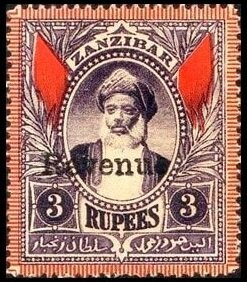Stamp: Sultan Hammud ibn Muhammad (Zanzibar 1899)
Sultan Hammud ibn Muhammad (Zanzibar 1899)
01 January (Zanzibar ) within release Revenue goes into circulation Stamp Sultan Hammud ibn Muhammad face value 3 Indian rupee
| Stamp Sultan Hammud ibn Muhammad in catalogues | |
|---|---|
| Forbin: | For: TZ-ZB R3 |
Stamp is square format.
Postage stamp of 1899 overprinted "Revenue" in black Revenue Reverend cat. no: R73Also in the issue Revenue:
- Stamp - Queen Victoria (1819-1901) face value 1;
- Stamp - Sultan Hammud ibn Muhammad face value 1;
- Stamp - Sultan Hammud ibn Muhammad face value 2;
- Stamp - Sultan Hammud ibn Muhammad face value 3;
- Stamp - Sultan Hammud ibn Muhammad face value 4;
- Stamp - Sultan Hammud ibn Muhammad face value 5;
|
Data entry completed
56%
|
|
|---|---|
| Stamp Sultan Hammud ibn Muhammad in digits | |
| Country: | Zanzibar |
| Date: | 1899-01-01 |
| Print: | Recess |
| Perforation: | 14 |
| Emission: | Revenue |
| Format: | Stamp |
| Face Value: | 3 Indian rupee |
Stamp Sultan Hammud ibn Muhammad it reflects the thematic directions:
Famous People refers to the fame and public attention accorded by the mass media to individuals or groups or, occasionally, animals, but is usually applied to the persons or groups of people (celebrity couples, families, etc.) themselves who receive such a status of fame and attention. Celebrity status is often associated with wealth (commonly referred to as fame and fortune), while fame often provides opportunities to make money.
A head of state (or chief of state) is the public persona that officially represents the national unity and legitimacy of a sovereign state. In some countries, the head of state is a ceremonial figurehead with limited or no executive power, while in others, the head of state is also the head of government. In countries with parliamentary governments, the head of state is typically a ceremonial figurehead that does not actually guide day-to-day government activities and may not be empowered to exercise any kind of secular political authority (e.g., Queen Elizabeth II as Head of the Commonwealth). In countries where the head of state is also the head of government, the president serves as both a public figurehead and the actual highest ranking political leader who oversees the executive branch (e.g., the President of the United States).
A man is an adult male human. Prior to adulthood, a male human is referred to as a boy (a male child or adolescent).
The Arecaceae is a family of perennial, flowering plants in the monocot order Arecales. Their growth form can be climbers, shrubs, tree-like and stemless plants, all commonly known as palms. Those having a tree-like form are called palm trees. Currently, 181 genera with around 2,600 species are known,
most of which are restricted to tropical and subtropical climates. Most palms are distinguished by their large, compound, evergreen leaves, known as fronds, arranged at the top of an unbranched stem, except for the Hyphaene genus, who has branched palms. However, palms exhibit an enormous diversity in physical characteristics and inhabit nearly every type of habitat within their range, from rainforests to deserts.
Sultan is a title of Arabic origin for Islamic rulers who are monarchs. The title often corresponds to that of a king.





